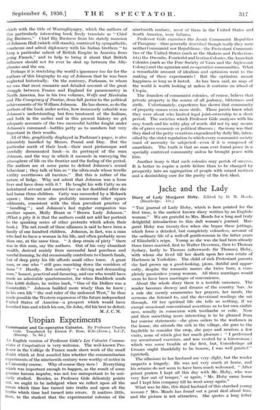Utopian Experiments
Communist and Go-operative Colonies. By Professor Charles Gide. Translated by Ernest F. Row, R.Se.(Eeon.), L.C.P. (Harrap. 7s. M.)
An English version of Professor Gide's Les Colonies Comma- aisles et Cooperatives is very welcome. The well-known Pro- fessor in the College de France made short work of the small doubt which at first assailed him whether the communitarian experiments of the nineteenth century were worthy of notice in a University course. Why of course they were Everything which was important enough to happen, as the result of some genuine human impulse, was not too unimportant to be seri- ously studied. Besides, as Professor Gide delicately points out, we ought to be indulgent when we reflect upon all the errors which time has turned into truths and upon all the truths which time had turned into errors. It matters little, then, to the student that the experimental colonies of the nineteenth century, niost of them in the United States and South America, were failures.
Professor Gide examines the Jesuit Communist Republics of Paraguay—thus generally described though really they were neither Communist nor Republican—the Protestant Communi- ties of the United States (such as the Shakers and Perfection- ists) the Owenite, Fourierist and Icarian Colonies, the Anarchist Colonies (such as the Free Society of Vaux and the Aiglemont Colony) and the agrarian and co-operative communities. What a remarkable amount of idealism and optimism went to the making of these experiments But the optimism meant happiness so long as it lasted. As has been said, no map of the world is worth looking at unless it contains an island of Utopia.
The founders of communist colonies, of course, believe that private property is the source of all jealousy, bitterness and strife. Unfortunately, experience has shown that community of property causes even more strife. Those jurists knew what they were about who limited legal joint-ownership to a short period. The societies which Professor Gide analyses with his easy touch and his witty play of words did not by any means die of grave economic or political illnesses ; the irony was that they died of the petty vexations engendered by daily life, inten- sified by the strict regulation to which every communist society must of necessity be subjected—even if it is composed of anarchists. The truth is that no man ever found peace in a specially contrived community unless he brought peace with him.
Another irony is that such colonies may perish of success. It is better to expire a noble failure than to be changed by prosperity into an aggregation of people with mixed motives and a diminishing care for the purity of the first ideal.






























 Previous page
Previous page